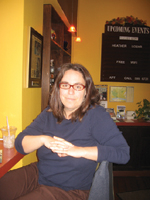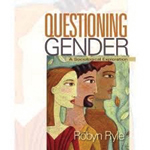



Thinking Beyond Pink and Blue
Professor
Ryle publishes
textbook on sociology of gender
The
new book draws
from classroom experiences
By
Lela Jane Bradshaw
Contributing Writer
(June 2011) – “Why aren’t you wearing
a skirt today?”
While such a question may elicit startled laugher when posed to a male
student, in Dr. Robin Ryle’s Sociology of Gender class, there are
actually serious reasons behind it.
“Sociologists ask questions that seem stupid at first but actually
have interesting answers,” Ryle explains with a smile.
 |
|
Photo
provided Robin
Ryle uses |
For seven years, Ryle, 37, has been challenging her Hanover
College sociology students to reconsider their assumptions about gender
with questions just like this one. “What you see when you’re
walking around isn’t sex, it’s gender,” she says. She
points out that while sex refers to biological characteristics, gender
deals with characteristics that have culturally become associated with
men and women.
She notes that whether or not a man would find it appropriate to wear
a skirt-like garment would depend heavily on the time period and society
where he was raised. Ryle laughingly notes that after such a discussion,
students will frequently make comments along the lines of “This
class makes my brain hurt!” a sure sign that they are deeply engaged
with the day’s topics.
Now with the publication of her new textbook, students across the country
will be wrestling with the same issues Ryle has been using to challenge
her classes. In February, Ryle released her textbook, “Questioning
Gender: A Sociological Exploration.” The result of five years of
work, the book is “based on teaching my sociology of gender class”
and is designed for use in undergraduate classrooms.
“A lot of what we do in the class and the textbook is look at our
assumptions,” she explains. Ryle challenges students to examine
“why things are the way they are” and believes that a successful
class “shakes up the way they think about the world.”
One classroom technique that made its way into the book was the use
of what Ryle terms “cultural artifacts” to make points and
spark thought and debate. These cultural artifacts include things such
as commercials, ads and snippets of TV shows – “Just
ways to get people thinking about ways that things in society are gendered,”
she says.
For example, Ryle often points out the differences in the packaging
of razors marketed to men and women. “We believe in gender, and
so we look for a lot of gender differences,” she explains. “What
we think of as biological issues have a social component as well.”
In light of the book’s release, Ryle was invited to speak at the
Carnegie Center for Art and History in New Albany, Ind., as part of
their March programming for women’s history month. Karen Gillenwater,
a curator at the Center, explains the decision to invite Ryle to speak
saying,“We were looking for something the general public would
be interested in.”
 |
The talk took place during the Carnegie Center’s
exhibition of ENID: Generations of Women Sculptors, showcasing the work
of 15 female sculptors. Ryle spoke about gender in the media and popular
culture. Her insights on the way gender influences the way people present
images and themselves made for an interesting discussion in light of
the exhibit of the work of a women’s artist group. The presentation
attracted a varied group of people, including students from an area
women’s studies program, Hanover College alumni, art lovers and
curious community members.
“The audience had a lot of questions,” reports Gillenwater,
and she characterized the talk as generating a “great dialog. The
audience seemed very engaged.”
Ryle’s current project is “something completely different”
from her textbook. Ryle is now working on collecting oral histories
from farmers in the Ohio River Valley, an outgrowth of her interest
in environmental sociology. She is also considering assembling “interviews
with Madison residents in general and maybe doing a blog about all the
different stories people have to tell.”
She appreciates the fact that she has the freedom to explore a range
of issues in sociology and notes that, “The nice thing about being
a professor at a small liberal arts college is that you can be broad
rather than narrow.”